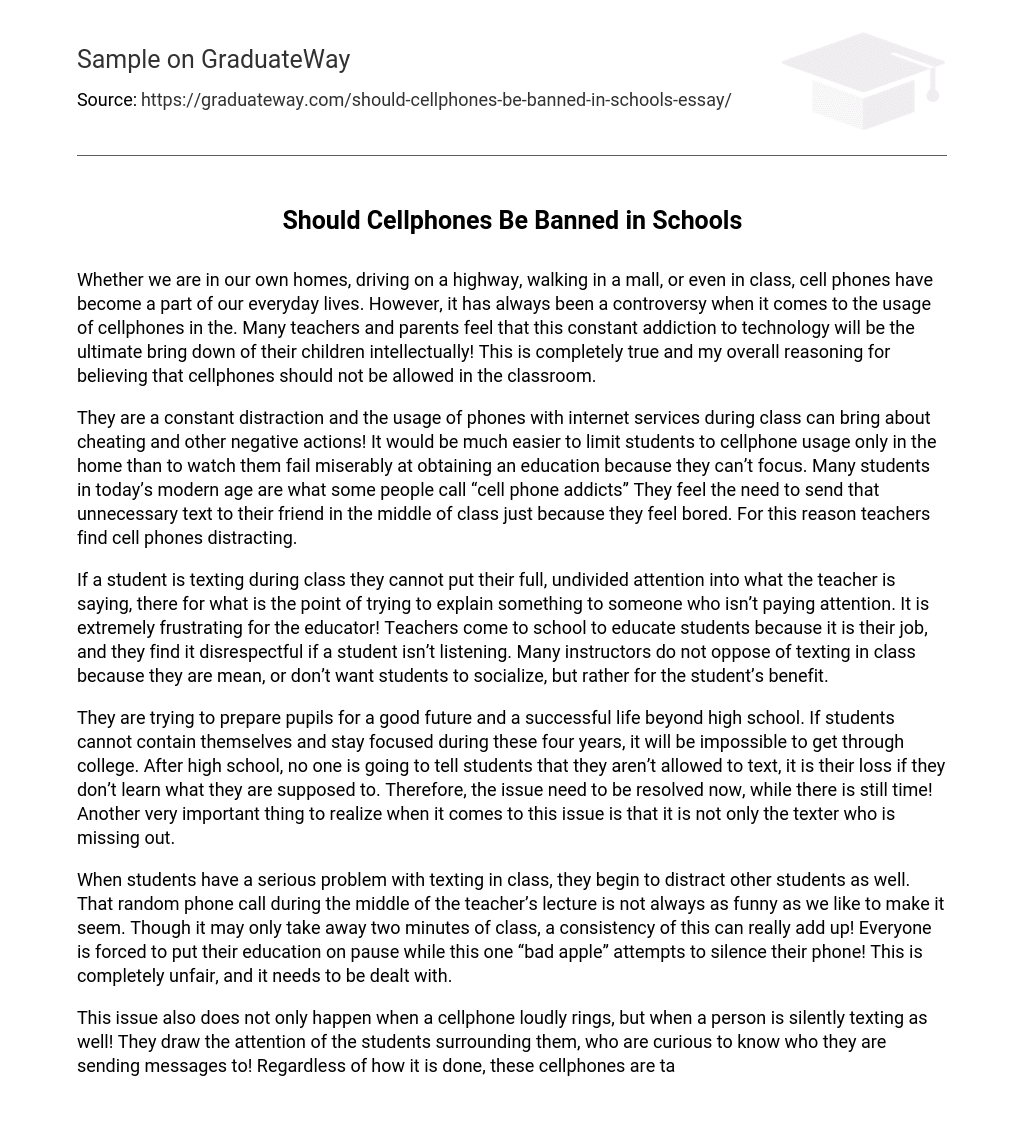Cell phones have become a crucial component of our everyday routines, whether we are at home, on the go, shopping, or in school. Nevertheless, the utilization of these gadgets in educational settings has been a subject of debate and dissent for quite some time. A multitude of educators and parents contend that this perpetual dependence on technology will impede their children’s cognitive growth. I concur with this perspective and advocate for prohibiting cell phones in academic surroundings.
Limiting the use of cell phones with internet access in classrooms can prevent disruptions, cheating, and other undesirable behaviors. This restriction aims to maintain focus and avoid hindering students’ education. Presently, numerous students are referred to as “cell phone addicts” who yield to the temptation of sending unnecessary text messages to friends during class due to boredom. Consequently, educators perceive cell phones as disruptive.
Texting on a phone during class prevents students from fully concentrating on the teacher’s words, making it pointless to try and explain something to an inattentive individual. This lack of focus can be extremely frustrating for educators who aim to educate their students. Disregarding teachers and failing to listen is disrespectful. It should be noted that many instructors do not prohibit texting in class out of unkindness or a desire to discourage socializing; instead, this regulation is put in place for the benefit of the students.
Preparation for a prosperous future and thriving life after high school is paramount. Neglecting self-discipline and focus during these crucial four years can severely impede college success. In college, there are no limitations on texting habits, so if students fail to acquire the essential knowledge, they alone will face the consequences. Hence, it is imperative to address this issue while we still have an opportunity! It’s vital to recognize that this problem does not solely impact the person texting.
Texting excessively in class is not only a distraction to other students but also interrupts the teacher’s lecture. While it may occasionally be amusing, receiving an unexpected phone call during a lesson is not always humorous. Though seemingly minor, these disruptions can accumulate and have a negative impact on the entire class. Everyone’s education is halted while one disruptive individual tries to silence their phone. This situation is truly unjust and needs to be addressed.
This issue occurs not only when a cellphone loudly rings, but also when a person is quietly texting. Both actions attract the attention of surrounding students, who are curious about the recipients of the messages. Regardless of the method used, these cellphones detract from the education of numerous students. It is particularly unjust when it is not the student using the cellphone who is at risk of harming their future.
Teachers not only prepare students for university and college but also for their lives beyond the educational boarders. When these children become adults and have to work in order to provide for their families, they need to be accustomed to proper behavior in different settings. Using cell phones at work is strictly prohibited. Having an employee who is constantly engrossed in their phone instead of focusing on their job is unacceptable. Multitasking with a phone is not possible while performing work duties.
It is not advisable to use your cellphone covertly in the professional and respectful business industry. This raises concerns for children who have developed an addiction to their cellphones, making it crucial to tackle this problem from an early stage. Students frequently assert that they are entitled to use their cellphones during class since they own them. They believe they can successfully multitask by texting while paying attention, but this is an unattainable goal regardless of their efforts!
Both learning and working necessitate concentrated attention, whereas leisure activities offer a respite. Nonetheless, texting can serve as a significant diversion from essential responsibilities such as actively participating in class. This not only impairs students’ concentration but also disturbs their peers and develops into a harmful habit that hampers academic advancement. To effectively tackle this concern, it is crucial to enforce a ban on cellphones in schools.





